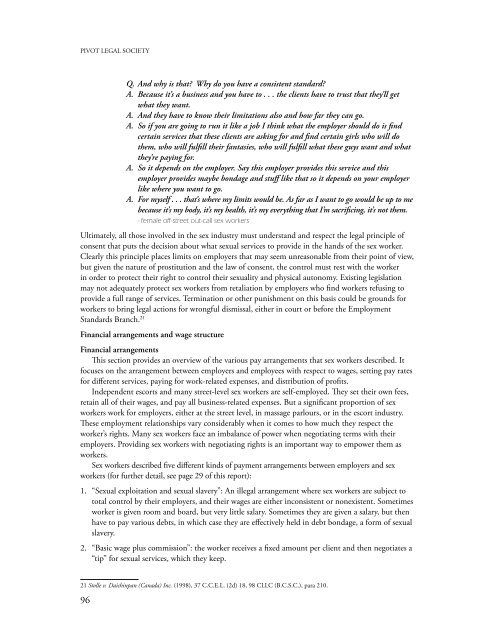Beyond Decriminalization: Sex-work, Human Rights and a New ...
Beyond Decriminalization: Sex-work, Human Rights and a New ...
Beyond Decriminalization: Sex-work, Human Rights and a New ...
- No tags were found...
Create successful ePaper yourself
Turn your PDF publications into a flip-book with our unique Google optimized e-Paper software.
PIVOT LEGAL SOCIETYQ. And why is that? Why do you have a consistent st<strong>and</strong>ard?A. Because it’s a business <strong>and</strong> you have to . . . the clients have to trust that they’ll getwhat they want.A. And they have to know their limitations also <strong>and</strong> how far they can go.A. So if you are going to run it like a job I think what the employer should do is findcertain services that these clients are asking for <strong>and</strong> find certain girls who will dothem, who will fulfill their fantasies, who will fulfill what these guys want <strong>and</strong> whatthey’re paying for.A. So it depends on the employer. Say this employer provides this service <strong>and</strong> thisemployer provides maybe bondage <strong>and</strong> stuff like that so it depends on your employerlike where you want to go.A. For myself . . . that’s where my limits would be. As far as I want to go would be up to mebecause it’s my body, it’s my health, it’s my everything that I’m sacrificing, it’s not them.- female off-street out-call sex <strong>work</strong>ersUltimately, all those involved in the sex industry must underst<strong>and</strong> <strong>and</strong> respect the legal principle ofconsent that puts the decision about what sexual services to provide in the h<strong>and</strong>s of the sex <strong>work</strong>er.Clearly this principle places limits on employers that may seem unreasonable from their point of view,but given the nature of prostitution <strong>and</strong> the law of consent, the control must rest with the <strong>work</strong>erin order to protect their right to control their sexuality <strong>and</strong> physical autonomy. Existing legislationmay not adequately protect sex <strong>work</strong>ers from retaliation by employers who find <strong>work</strong>ers refusing toprovide a full range of services. Termination or other punishment on this basis could be grounds for<strong>work</strong>ers to bring legal actions for wrongful dismissal, either in court or before the EmploymentSt<strong>and</strong>ards Branch. 21Financial arrangements <strong>and</strong> wage structureFinancial arrangementsThis section provides an overview of the various pay arrangements that sex <strong>work</strong>ers described. Itfocuses on the arrangement between employers <strong>and</strong> employees with respect to wages, setting pay ratesfor different services, paying for <strong>work</strong>-related expenses, <strong>and</strong> distribution of profits.Independent escorts <strong>and</strong> many street-level sex <strong>work</strong>ers are self-employed. They set their own fees,retain all of their wages, <strong>and</strong> pay all business-related expenses. But a significant proportion of sex<strong>work</strong>ers <strong>work</strong> for employers, either at the street level, in massage parlours, or in the escort industry.These employment relationships vary considerably when it comes to how much they respect the<strong>work</strong>er’s rights. Many sex <strong>work</strong>ers face an imbalance of power when negotiating terms with theiremployers. Providing sex <strong>work</strong>ers with negotiating rights is an important way to empower them as<strong>work</strong>ers.<strong>Sex</strong> <strong>work</strong>ers described five different kinds of payment arrangements between employers <strong>and</strong> sex<strong>work</strong>ers (for further detail, see page 29 of this report):1. “<strong>Sex</strong>ual exploitation <strong>and</strong> sexual slavery”: An illegal arrangement where sex <strong>work</strong>ers are subject tototal control by their employers, <strong>and</strong> their wages are either inconsistent or nonexistent. Sometimes<strong>work</strong>er is given room <strong>and</strong> board, but very little salary. Sometimes they are given a salary, but thenhave to pay various debts, in which case they are effectively held in debt bondage, a form of sexualslavery.2. “Basic wage plus commission”: the <strong>work</strong>er receives a fixed amount per client <strong>and</strong> then negotiates a“tip” for sexual services, which they keep.21 Stolle v. Daishinpan (Canada) Inc. (1998), 37 C.C.E.L. (2d) 18, 98 CLLC (B.C.S.C.), para 210.96
















